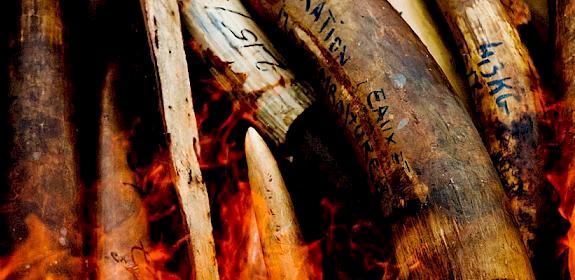NGO call for action to save the elephants of Central Africa
Brazzaville, Republic of Congo, 26th April 2013 - A recent study shows forest elephant populations in the Congo Basin fell by almost two-thirds - or 62% -over the past decade as a result of extensive ivory poaching.

Without action, it is likely that the elephant, the largest land mammal on earth, will follow in the footsteps of the rhinoceroses in Central Africa, which have been hunted to extinction for their horns.
This wildlife crime has a destabilizing effect on the governance of countries in the sub-region. Rampant poaching and illegal wildlife trade nurtures international criminality and undermines the economic and social prospects of Central African states. It is in the economic interest of these countries to vigorously combat this scourge.
Many of the largest conservation organizations active in the Congo Basin (see list of organizations below) convened in Brazzaville, Republic of Congo, to propose effective solutions to this poaching crisis. They called for States of the sub-region to implement these solutions in order to save their elephants, which they themselves have qualified as a universal natural heritage of humanity.
To save this natural heritage, it is imperative, and in the shortest time period possible, that the presidents or the prime ministers of the Central African States lead the fight against wildlife crime by piloting and overseeing National Coordination Units (NCUs). These units, which will comprise experts from the administrations of the prime minister, of counter-intelligence, justice, wildlife, police, Customs and defence units, will share information, co-ordinate field operations, prosecution, and collaborate with technical partners.
At the supranational level, the heads of these NCUs should co-ordinate with the countries of the region, on a case-by-case basis, depending on the information at hand and the urgency of the situation. These units will share information with their counterparts in the countries that have associated links with wildlife criminality – including transit countries for illegal wildlife products such as Nigeria, Sudan, Togo and Guinea Conakry – and with specialized international organizations such as INTERPOL.
Finally, the monitoring and evaluation of the implementation of these NCUs must be made by the Forestry Commission of Central Africa on an annual basis and be based on information received by email from the heads of the NCUs.
In addition, the States of Central Africa must immediately:
1.Signal to poachers and the criminal trafficking networks that the natural heritage of Central Africa will be defended
2. Adopt an attitude of "zero tolerance" against corruption – Undue influence, abuse of power and other forms of corruption relating to trading are the primary obstacles to effective enforcement against major traffickers of illegal wildlife products in Central Africa.
3. Increase the penalties and strengthen enforcement relating to wildlife crimes, as well as crimes relating to the sale of arms and large-scale ammunition-based hunting. Earlier this week, Mr. Yury Fedotov, Executive Director of the United Nations Office against Drugs and Crime (UNODC), called for wildlife offenses to be punished with imprisonment of four years or more. Undocumented weapons and ammunition seized in flagrante delicto should systematically be destroyed.
4. Focus on the protection and proper management of certain priority protected areas – These areas should become core areas for the protection of wildlife in the sub-region and be co-managed long term by specialized non-governmental agencies.
5. Initiate a dialogue with consumer countries – China and Thailand are, respectively, the largest ivory consumer and the largest center of legal ivory trade in the world. In the long-term, the survival of the elephants in Central Africa and throughout the world depends on the end of international ivory demand. Thus, it is essential that the Central Africa States have bilateral dialogues with China and Thailand, explaining the ecological, economic and security consequences of their demand for ivory.
It is important to note that the Central Africa States have already begun implementing a number of these recommendations, including through regional institutions. It is particularly encouraging to note that some countries have already started strengthening their wildlife laws, making their first arrests and convictions of major traffickers, as well as making audits of their ivory stocks and destroying them.
That said, Central Africa is pressed for time, and wildlife criminals are still active throughout the region. We are here to ask the Central Africa States, the guardians of these elephants, to renew their efforts to save this natural heritage.
A certain amount of regional coordination is needed. Nevertheless, it is countries of Central Africa who are capable of saving the elephants. The survival of this natural heritage of elephants depends entirely on the willingness of the states, their governments and their citizens to take steps to stop wildlife criminality.
We, the conservation organizations, look forward to continuing to work with the Central Africa States to end large-scale poaching and wildlife crime.
The time for talk is over. Take Action!
African Parks Network (APN)
International Fund for Animal Welfare (IFAW)
Fondation pour le Tri-National de Sangha (FTNS)
Projet d'appui à l'Application de la Loi sur la Faune Sauvage (PALF)
The Wildlife Trade Monotoring Network (TRAFFIC)
Union Internationale pour la Conservation de la Nature (UICN)
Wildlife Conservation Society (WCS)
World Wide Fund for Nature (WWF)




